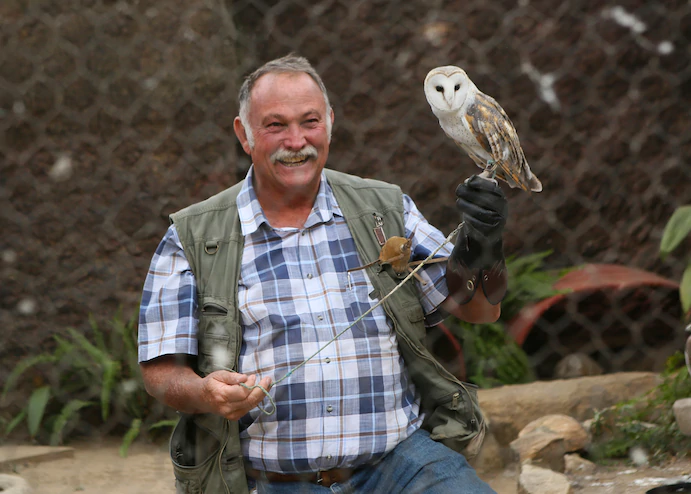Zimbabwe bird sanctuary has 400 species, insufficient tourists

Image collected
A seafood eagle swoops over the normal water to grab a fish in its talons and flies to its nest.
Nearby certainly are a martial eagle, a dark-colored eagle, an Egyptian vulture and hundreds of various other birds. With around 400 species of birds on an idyllic spot on Zimbabwe’s Lake Chivero, about 40 kilometers (25 kilometers) south of Harare, the Kuimba Shiri bird sanctuary features been drawing vacationers for a lot more than 15 years.
The southern African country’s only bird park has survived tumultuous times, including violent property invasions and a devastating monetary collapse but the outbreak of coronavirus is proving a stern test.
“I thought I had survived the worst, but this coronavirus is something else,” explained owner Gary Strafford. “One-third of our site visitors will be from China. They halted coming in February ... and when we were turn off in March, that was merely unbelievable.”
A life-long bird enthusiast, Strafford, 62, established the guts for injured, orphaned and abandoned birds in 1992 and tourism has kept the recreation area going.
With Zimbabwe’s inflation growing to over 750%, tourism establishments are battling a vicious monetary downturn worsened by the brand new coronavirus travel restrictions.
Zimbabwe’s tourism had been facing problems. The united states recorded just over 2 million visitors in 2019, an 11% decline from the prior year, according to established figures. Nevertheless, tourism remained among the country’s biggest forex earners, along with minerals and tobacco.
Now tourism “is dead as a result of coronavirus,” stated Tinashe Farawo, the spokesman for the country’s countrywide parks agency. National parks and various other pet sanctuaries such as Kuimba Shiri happen to be battling to stay afloat, he said.
“We are in big trouble. All along we've been relying on tourism to invest in our conservation ... now what do we perform?” he asked.
Kuimba Shiri, which means singing bird in Zimbabwe’s Shona words, was closed for a lot more than 90 days. It’s the longest period the bird sanctuary, found in among the global sites shielded under the US Convention on Wetlands, provides been shut.
On a recent weekday, the only audio of life at the area usually teeming with children on college trips was that of singing birds perched on the edges of large enclosures. Horses, zebras and sheep fed on grass and weeds on the lakeshore.
A parrot standing on a flower pot at the access repeatedly shouted “Hello!”
“He misses persons, especially the kids,” said Strafford, who also established Kuimba Shiri on the 30-acre i'm all over this Chivero, the key reservoir for Harare. Right now it is home to many rare species incorporating falcons, flamingos and vultures.
“This place is a dream place for me,” he said.
Things turned nightmarish but when in that case president, the late Robert Mugabe, launched a great often-violent land redistribution software where farms owned by whites were seized for redistribution to landless Blacks found in 2000.
Animal sanctuaries were not spared and Kuimba Shiri was targeted “30 to 40 times,” stated Strafford. Eventually, the sanctuary was endorsed by Mugabe and came back to a measure of stability.
In 2009 2009, Zimbabwe’s economy collapsed as hyperinflation reached 500 billion percent, according to the International Monetary Fund. The sanctuary struggled to create ends meet. Many birds starved to loss of life while the ones that could fend for themselves were released in to the wild.
“We sold our cars and a good tractor to feed the birds. When it certainly got desperate we had to kill our horses,” he stated.
Now, ten years later, Strafford is once again being forced to sell some items simply because coronavirus and a fresh economic crisis have their toll. A property excavator, a boat, a vehicle, a tractor and sheep happen to be among the things he expectations to urgently sell.
But right now there is some hope. As Zimbabwe relaxes a few of its limitations, the sanctuary is currently able to available to limited amounts of visitors.
On a recently available weekend, Strafford displayed the talents of his trained falcons and other raptors to a little group for the first time since March.
Strafford enthusiastically described the many characteristics of the birds and supervised as a barn owl perched on a 5-year-old boy’s gloved hand.
“Everything got to begin afresh,” he said following the show. “I've started training the birds once again. We are starting to fly again!”
Copyright 2020 The Associated Press. All rights reserved. This material might not be posted, broadcast, rewritten or redistributed without permission.
Source: https://www.washingtonpost.com